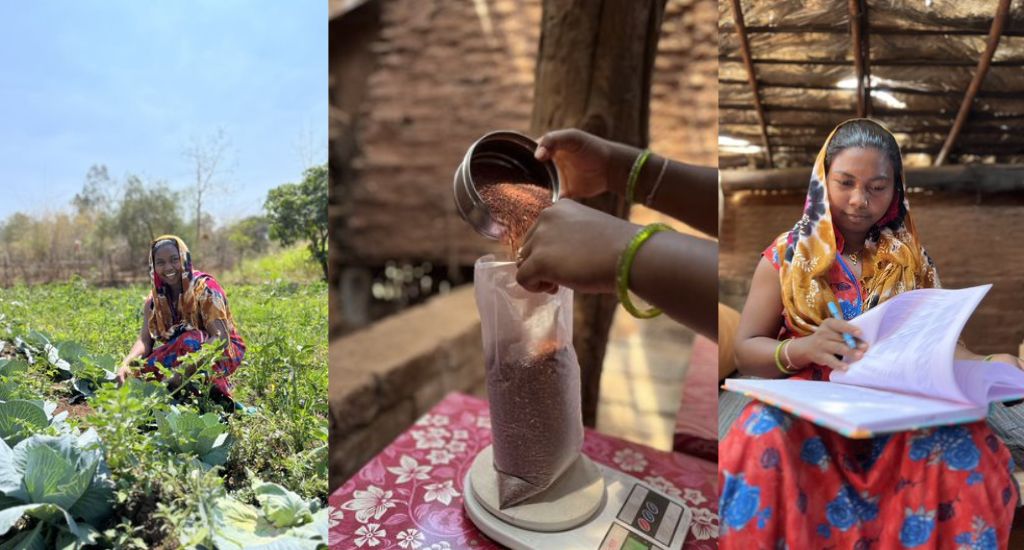
She sowed seeds of a grain bank to feed the poor
The sight of marginalised families struggling to have regular, nutritious meals prompted Urmilaben Vasava of Bedada village in Gujarat to start a grain bank.

The sight of marginalised families struggling to have regular, nutritious meals prompted Urmilaben Vasava of Bedada village in Gujarat to start a grain bank.
The marginalised families of Bedada village in Narmada district of Gujarat have to face many problems, the biggest one perhaps being lack of sufficient resources to purchase rations. Malnutrition is a huge problem in this region, especially in Bedada.
There are many families unable to consume three meals a day. They survive on just roti and water, that too probably eaten once a day.
This lack of nutritious diet is affecting their health adversely. In the long run, they will be more susceptible to diseases and serious health issues. The quality of life gets compromised, to say the least.
Urmilaben Vasava of Bedada village decided to do something about the situation so that the poor families could have nutritious food.
Vasava came to know of Aga Khan Rural Support Programme (India) (AKRSP-I) wherein they, with the financial support of InterGlobe Foundation, distribute kitchen garden kits. She got in touch with the AKRSP-I team.

When she wanted to support the poor families in her village, she remembered a grain bank in Dediapada taluk. She knew how it worked.
The grain bank would safeguard people against starvation during periods of natural calamity or when production was low.
Vasava reasoned that the disadvantaged communities would have access to nutritious food through the grain bank. Wondering if a similar grain bank could be started in her village, she approached the AKRSP-I team.
In September 2022, the idea took further shape. To manage the grain bank, 15 members came together and formed a self-help group (SHG).

The team decided to buy specific pulses and grains that the local people use. The organisation provided 13 varieties of pulses and grains — wheat, jowar, nagli, peas, green chickpeas, green gram, masoor dal, pigeon peas, gram (mag dal) and urad dal.
Also Read | Anaj Bank frees Dalits from fear of hunger in Bihar
AKRSP-I provided the barrels to store the pulses and grains.
Vasava was given the baton of presidency of the SHG, and it was decided that the grain bank would function at her house.
The SHG members developed the structure of the grain bank. They decided that the grains and pulses would be provided at a subsidised cost to the extremely poor members of the Kotwalia and Kathudia communities.
Moreover, widows, malnourished children and other marginalised families would be prioritised. The bank will be kept under the ownership of the Unnat Sakhi Mandal (SHG), Bedada. As the president, Vasava would run the bank.
They prepared two registers, one to document the grains supplied, and the other to capture the amount paid or due and the date of recovery. Vasava and the other women record the transactions in the registers.

The families who can’t afford the grains give 50 percent of the cost first. After two months, if the family is able enough, they have to pay 25 percent in two instalments.
The group uses the money collected through this exchange to purchase pulses and grains again.
Also, during every harvest season, the members of the group go on a mobilisation drive to collect grains from every household as per their capacity and desire. This rally also helps mobilise more people and spread awareness about the bank in Bedada and the surrounding villages.
Some vegetables are also collected, so that the beneficiaries get access to varied nutrition. Moreover, there are families who voluntarily visit the grain bank to donate some local indigenous varieties of pulses and grains.
Jowar, nagli, mag, vatana and tuvar are the most commonly consumed grains. People are not comfortable trying other nutritious pulses.

One of Vasava’s efforts to tackle this issue is the barter system. The poor families have to bring the pulse and grain they commonly consume and exchange it for one with higher nutritious content. This exchange happens for equal weight of the goods.
Also Read | Women contribute grains to support vulnerable families during lockdown
Vasava said this is working out, but people are still reluctant to opt for it because they are yet to develop the taste for these pulses.
She plans to conduct awareness drives in the village to improve the visibility of this bank. She also aspires to make people aware of the importance of health and nutrition.
The lead image shows sacks of pulses (Photo courtesy Engin Akyurt, Unsplash)
Kristy Saikia is a development professional, currently working as a programme specialist in monitoring and evaluation in the rural areas of south Gujarat. Spending time with the community and constantly learning new things about them has been the greatest highlight of her life.